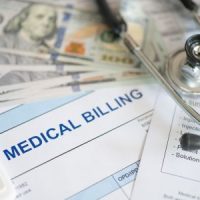What is the #1 Cause of Bankruptcies?

Medical bills are the #1 cause of consumer bankruptcies in Illinois. Many hoped the 2010 Affordable Care Act would stem the tide of medical bill bankruptcies. Indeed, the proportion of medical bankruptcies declined from about 65 percent to about 40 percent. However, high medical bills are still the #1 cause.
Usually, then money gets tight, people stop paying very small medical bills or very large ones. When consumers allow unpaid lab fees and other such costs to slide, debt buyers quickly snap up these accounts. Repeated referrals to collection agencies often cause credit scores to plummet. Large unpaid medical bills have an even more drastic effect. When medical bills reach five or six digits, many people quit trying to pay them.
Bankruptcy is usually the best option in these situations. When a Chicago bankruptcy lawyer files a voluntary petition, the Automatic Stay freezes collection notices, creditor lawsuits, and other adverse creditor actions. Furthermore, as outlined below, both major kinds of consumer bankruptcy give distressed debtors a way out of these seemingly hopeless situations.
Discharge in a Chapter 7
This kind of bankruptcy may be the solution to nickel-and-dime medical bill debt. Chapter 7 discharges these and most other unsecured debts, usually in less than six months.
Other unsecured debts include credit cards, payday loans, SBA loans, and revolving debt agreements. Some unsecured debts, like student loans and back taxes, are priority unsecured debts which are dischargeable in some situations only.
“Discharge” means the judge eliminates the legal obligation to repay a debt. However, the debt itself remains. If Tom owes Dr. Jones $1,000, Tom’s Chapter 7 erases the repayment obligation. So, Dr. Jones can’t try to collect the debt, sell it to a debt buyer, or make any other such efforts. However, Dr. Jones can refuse to treat Tom until the $1,000 is paid or other arrangements are made.
That’s when a Chicago bankruptcy lawyer steps in. If Tom wants to stay in Dr Jones’ good graces, he can voluntarily reaffirm that medical debt. Renegotiating key terms is part of the reaffirmation agreement process. For example, Dr. Jones might cut the balance in half if Tom agrees to an automatic debit repayment plan.
Debtors must use reaffirmation agreements sparingly. If a debtor reaffirms too many debts, the trustee (person who manages the bankruptcy for the judge) may believe the debtor isn’t in financial distress and doesn’t need Chapter 7 relief. That belief could lead to unwanted questions and perhaps adverse legal actions.
Repayment in a Chapter 13
Large medical debts often call for Chapter 13 bankruptcy. This kind of bankruptcy gives debtors up to five years to repay allowed claims, such as arrearage on reaffirmed unsecured debts.
Many people feel a strong moral obligation to pay their debts. We totally get that. Other people want to continue treatment with a certain doctor, as outlined above. A lawyer can renegotiate unsecured debt terms in a Chapter 13 in the same way these matters are renegotiated in a Chapter 7.
Creditors know they’re under the gun in these cases. They know that if they don’t make a favorable deal, the judge will discharge the debt, most likely leaving them with nothing. Other repayment plan debts in a Chapter 13 include past-due mortgage and car payments.
Speak With a Detail-Oriented Cook County Lawyer
No matter what kind of financial problem you are having, there’s a way out. For a free consultation with an experienced bankruptcy attorney in Chicago, contact the Bentz Holguin Law Firm, LLC. The sooner you reach out to us, the sooner we start working for you.
Source:
pmc.ncbi.nlm.nih.gov/articles/PMC6366487/


